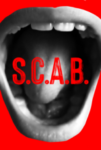
C stands for Comedy
I remember trawling through SCABs after that very first call with Marc and finding two things that terrified me. The first was students’ descriptions of Selection Day, whereby they had to put on a creative ‘performance’ in front of the whole cohort and all the mentors. Luckily Marc changed the process to a more introvert-friendly one for Honey – thank God because I don’t think I could’ve done that (BUT *note to prospective students* he has changed it back since then, I’m guessing so that the likes of me can’t slip through the net again…).
The second was the mention of being made to do stand-up. Reading those words sent shivers down my spine. Had you asked me before starting SCA if I’d rather do that, or bungee-jump off a cliff, I would’ve said the latter. And I’m scared of heights.
As the months at SCA went on with no mention of stand-up, I allowed myself to hope that Marc had abandoned this too. Until he revealed the ‘prize’ for the team who had won the sticker brief. Which included me. Fuck.
Two-and-a-half hours of comedy school every Wednesday for six weeks, culminating in a five-minute stand-up gig in a PUBLIC comedy venue.
We’re three weeks in now, and I’ll cautiously admit that it’s not the worst thing in the world. Our teacher, Mr Cee, is lovely and very understanding of just how far outside our comfort zone some of us are. That feeling of sitting down having stood up and just had a go is great. But I do dread it every week, and I do need a pint just before every class.
One thing you might be wondering is WHY?! Why would Marc make us do this, besides the obvious fact that he’s a sadist? I used to think it was just to build our confidence and prepare us for a pitch-heavy industry. Turns out stand-up and advertising mirror each other in a lot of ways:
Public speaking (acting, persuasive)
Let’s start with the obvious one: stand-up is basically a funny pitch. You have to be confident and engaging, and really make the most of your voice and body language. And yes, that includes EYE CONTACT.
It’s copywriting out loud
You have to paint vivid pictures in the audience’s mind using words. Similes, metaphors, whatever it takes. And the more unexpected and specific the better if you want to get a laugh.
Emotional connection
Displaying emotion is the difference between being boring and interesting. It doesn’t matter what you’re saying – if you don’t convince people that you really believe it or feel it, they’ll switch off. That said, what you say is important (duh). You forge connections with an audience through human truths – truths they relate to and maybe hadn’t even been conscious of before. In comedy, they’re called observations.
There’s always a punch
In comedy, there’s the punch line (or punch word, as Mr Cee prefers to call it) – the bit that hopefully lands your joke and makes people laugh. But a punch doesn’t always have to be funny. In TVCs you have a ‘hook’, ‘twist’ and ‘punch’, where the punch is that part at the end that lands the brand’s message. The more emotional the better.
See? I bet you non-comedy students are kicking yourselves now. Sorry, you can’t sit with us. But you can sit in front of us and laugh at all our jokes to raise money for The Comedy School Charitable Trust on 26th February. See you there.











